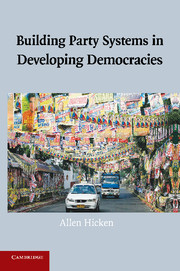Book contents
- Frontmatter
- Contents
- Acknowledgments
- Building Party Systems in Developing Democracies
- 1 Introduction
- 2 A Theory of Aggregation Incentives
- 3 Testing the Theory
- 4 Aggregation, Nationalization, and the Number of Parties in Thailand
- 5 Explaining Aggregation in Thailand
- 6 Term Limits, Aggregation Incentives, and the Number of Parties in the Philippines
- 7 Conclusion
- References
- Index
3 - Testing the Theory
Published online by Cambridge University Press: 29 July 2009
- Frontmatter
- Contents
- Acknowledgments
- Building Party Systems in Developing Democracies
- 1 Introduction
- 2 A Theory of Aggregation Incentives
- 3 Testing the Theory
- 4 Aggregation, Nationalization, and the Number of Parties in Thailand
- 5 Explaining Aggregation in Thailand
- 6 Term Limits, Aggregation Incentives, and the Number of Parties in the Philippines
- 7 Conclusion
- References
- Index
Summary
INTRODUCTION
In Chapter 2 I developed a theory of aggregation incentives that stressed the interaction of the size of the aggregation payoff (itself a product of vertical and horizontal centralization) with the probability of capturing that prize. In this chapter, I turn to the task of testing some of the theory's hypotheses using a dataset of 280 elections in 46 countries. In Chapters 5 and 6, I conduct further tests of the theory using data from Thailand and the Philippines. The chapter proceeds as follows. In the next section, I discuss the operationalization and measurement of the dependent variable – party system aggregation. I then devote a section each examining the payoff to aggregation, the probability of capturing the payoff in parliamentary systems, the probability in presidential systems, and finally the effect of social heterogeneity on aggregation. In each of these sections, I derive a set of hypotheses from the theory outlined in Chapter 2, discuss my strategy for operationalizing the various explanatory (and control) variables of interest, describe the dataset used to test the hypotheses, and finally present the results of those tests. The final section concludes.
THE DEPENDENT VARIABLE: AGGREGATION AS INFLATION
As discussed in Chapter 1, the national party system is the product of two types of coordination – intra-district coordination and aggregation. Simply using the effective number of electoral parties in legislative elections is insufficient.
Information
- Type
- Chapter
- Information
- Building Party Systems in Developing Democracies , pp. 47 - 85Publisher: Cambridge University PressPrint publication year: 2009
